See also
- ↑ "Aguardente Williamine Mor.Poire c/Pêra". GLÓRIA WINES (in European Portuguese). Retrieved 2024-07-01.
- ↑ "Poire Williamine Morand". www.nicolas.com. Retrieved 2024-07-01.
Williamine is a brand of Poire Williams, an eau de vie produced with Williams pears, in Martigny, Canton of Valais, Switzerland. [1]
The trademark Williamine belongs to the Distillerie Louis Morand & Cie SA.
Williamine's William pears originate from nearby orchards and have been a traditional produce of Valais for over 100 years, exported to many countries. [2]
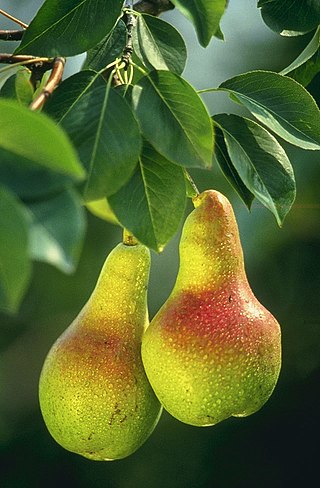
Pears are fruits produced and consumed around the world, growing on a tree and harvested in late summer into mid-autumn. The pear tree and shrub are a species of genus Pyrus, in the family Rosaceae, bearing the pomaceous fruit of the same name. Several species of pears are valued for their edible fruit and juices, while others are cultivated as trees.
Perry or pear cider is an alcoholic beverage made from fermented pears, traditionally in England, particularly Gloucestershire, Herefordshire, and Worcestershire, parts of South Wales and France, especially Normandy and Anjou, Canada, Australia and New Zealand.
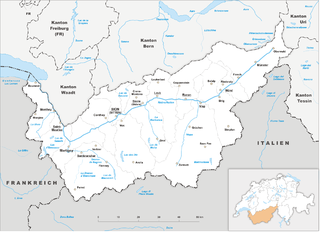
Valais, more formally, the Canton of Valais, is one of the 26 cantons forming the Swiss Confederation. It is composed of thirteen districts and its capital and largest city is Sion.
Schnapps or schnaps is a type of alcoholic beverage that may take several forms, including distilled fruit brandies, herbal liqueurs, infusions, and "flavored liqueurs" made by adding fruit syrups, spices, or artificial flavorings to neutral grain spirits.

Marsanne is a white wine grape, most commonly found in the Northern Rhône region. It is often blended with Roussanne. In Savoie the grape is known as grosse roussette. Outside France it is also grown in Switzerland, Spain, Australia, New Zealand, Canada and the United States.

Swiss cuisine is an ensemble of national, regional and local dishes, consisting of the ingredients, recipes and cooking techniques developed in Switzerland or assimilated from other cultures, particularly neighboring countries. The diversity and comprehensiveness of Swiss gastronomy reflects the linguistic, cultural and geographical diversity. The climate of Switzerland allows for a large variety of terroirs, and therefore a wide range of indigenous food, from simple cereals to refined products like cheese and wine.

An eau de vie is a clear, colourless fruit brandy that is produced by means of fermentation and double distillation. The fruit flavor is typically very light.
Belle de Brillet is a pear liqueur produced by Maison J. R. Brillet, France. It is made by infusing Brillet cognac with the essence of Williams pears. Roughly 20 pounds (9.1 kg) of pears are needed to produce each 750mL bottle.
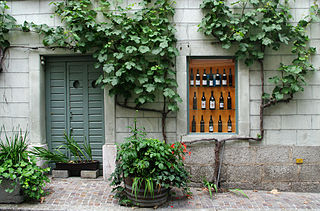
Swiss wine is produced from nearly 15,000 hectares of vineyards, and the wines are mainly produced in the west and in the south of Switzerland, in the cantons of Geneva, Neuchâtel, Ticino, Valais and Vaud. White grape varieties are grown on 43% of the country's vineyard area, and red grape varieties on 57%.

Antoine Dorsaz is a Swiss retired pair skater. With former partner Anaïs Morand, he is the 2008–2010 Swiss national champion.

The Williams' bon chrétien pear, commonly called the Williams pear, or the Bartlett pear in the United States and Canada, is a cultivar of the species Pyrus communis, commonly known as the European pear. The fruit has a bell shape, considered the traditional pear shape in the west, and its green skin turns yellow upon later ripening, although red-skinned derivative varieties exist. It is considered a summer pear, not as tolerant of cold as some varieties. It is often eaten raw, but holds its shape well when baked, and is a common choice for canned or other processed pear uses.
Fruit brandy is a distilled beverage produced from mash, juice, wine or residues of edible fruits. The term covers a broad class of spirits produced across the world, and typically excludes beverages made from grapes, which are referred to as plain brandy or pomace brandy. Apples, pears, apricots, plums and cherries are the most commonly used fruits.
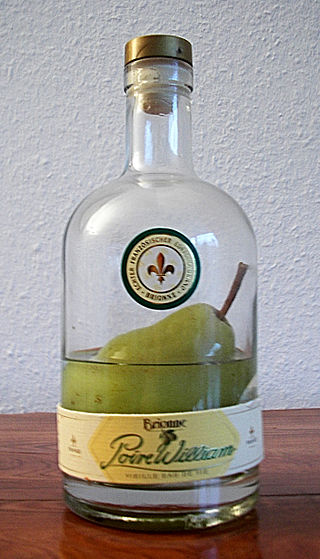
Poire Williams is the name for eau de vie made from the Williams pear in France and Switzerland. It is generally served chilled as an after-dinner drink. Some producers of Poire Williams include an entire pear inside each bottle, called prisonnière. This is achieved by attaching the bottle to a budding pear tree so that the pear will grow inside it.
A choke pear or chocky-pear is an astringent fruit. The term is used for the fruit of any variety of pear which has an astringent taste and is difficult to swallow.
Poiré as a surname may refer to:

Clear Creek Distillery is a distillery based in Hood River, Oregon, United States, and formerly in Portland, Oregon. Founded in 1985, it has been owned by Hood River Distillers since 2014. It is most well known for its eau de vie produced from Bartlett pears, though today it also makes a variety of other fruit brandies, aged spirits, and liqueurs.

A cholera is a pastry filled with potatoes, vegetables, fruits and cheese, originated from the Valais region of Switzerland.
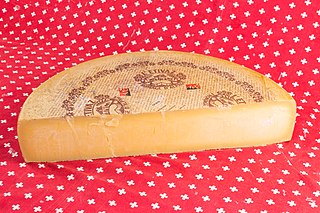
In Switzerland, the appellation d'origine protégée is a geographical indication protecting the origin and the quality of traditional food products other than wines.